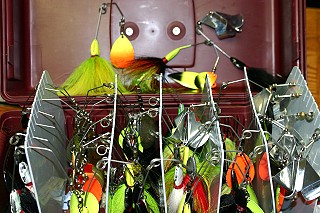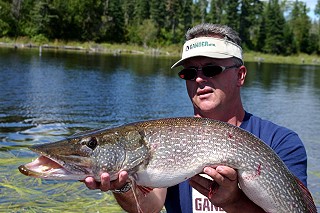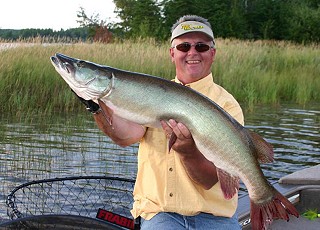| Ka Whoosh! For the third time on this particular hot, muggy, flat dog day afternoon I was startled by the gator-like eruption on the water’s surface way back in the thick impenetrable jungle of surface weeds. Only, this wasn’t central Florida – it was Ontario, Canada. So, this was no gator (alligator). Instead, it was bound to be a big musky or giant pike. However, try as I might, I simply couldn’t find many lures to work effectively thru this ultra thick emergent cover, nor were the fish interested in the few things I successfully fish by them.
The scorching hot flat water conditions combined with the surface commotion suggested something topwater, but what? Even my custom made TopRaiders, rigged without a belly treble hook, wouldn’t penetrate this stuff. I truly needed a 100% weedless bait, with a large single hook, no doubt, but the dark turbid waters also suggested a lure with some type of prop noise.
My unsuccessful efforts with several musky sized weedless spoons confirmed my hunches. Even though they were surely weedless enough, they didn’t have enough audio attraction to crank up these dark water demons. My memories quickly shifted to a recent Florida with big largemouths in similar thick emergent slop conditions with nearly identical water temperatures and water color. The answer on this memorable day was a big bass version buzz bait that could easily walk over, around, and thru all the surface debris, yet churn up commotion any time the multi-bladed delta style prop touched open water. This proved to be the answer to my Florida problem only a few months earlier, with numerous big fish encounters including one “double digit” bucketmouth that tipped the scales at nearly 11 pounds. I wondered, “Could a similar approach trick these slop predators of the north just as well?”
 |
With that in mind, I tore apart one of my production SlopMaster spinnerbaits, dug into my storage to find the same old trusty blade kit I’d carried around in my boat now for over 15 years, and found a few bass buzz blades to attach to it. After about ten minutes of cutting, pinching, bending and tuning, I had assembled a musky sized version of the lure that had worked so well for me on those Florida bass a few months beforehand. Only now, I had a 9/0 single hook on the business end followed by a 5/0 single hook trailer. This initial prototype, first generation SlopMaster Buzz Bait consisted of two delta style buzz blades bent so they were actually running side by side on the same wire shaft. Finally, I attached a small clicker blade to the vertical wire shaft immediately above the line tie, and adjusted the wire and blade so it would intercept the main buzzer blades as they revolved. The combination provided a real noisy metallic clatter and clang.Hopefully, it would be too much noise, although I doubted it.
Admittedly, whenever I get into one of these – design a bait for a situation – modes, I have a tendency to loose a bit of focus at first on catching fish, and more so on making the lure work correctly. Sometimes, the entire thing ends in an unsuccessful outing and a failure in lure modification or design. Yet, once in a while I hit a homerun with a new lure that the fish haven’t been exposed to before and the results can be rewarding on several fronts. For one, I get the pleasure of developing a new bait, and 2) the fish often respond ferociously to the new bait for a period of time, and some exciting catches are the result. This is exactly what occurred on this dog day last summer.
Now, before we get back to the actual fish catching true story behind this bait, let’s discuss a bit further why certain buzzbait designs are so good for these dark water, hot weather slop muskies over other conventional surface baits, or other slop lures.Dark water muskies really home in on sound, and are more so triggered by sound and vibrations initially than by any visual stimuli. The lateral line on a musky is highly sensitive to anything in their remote surroundings that gives off a prey-like vibe. If it flutters, splashes, or paddles, it is possible prey, and a mean ornery dark water musky is sure to investigate.
However, when the cover these fish are situated in gets real thick and actually projects itself onto the water’s surface, few lures can effectively work thru weed jungles without constant hang ups. In addition, many weedless lure designs simply do not function well emergent cover of any kind. They need some degree of open water in order to waddle, wiggle, or spin.This is not the case with a buzz bait. Especially versions that contain a large single wing delta design. The large blade turns on virtually no water, and can even rotate without water as it captures air current during the forward motion created as you retrieve. This makes this particular lure design the absolute perfect tool for the real nasty stuff.
It’s important to note that this lure style can actually be fished in thicker cover than any single hook spinnerbait style lure. In other words, it will fish thru the super thick cover that a standard Slopmaster style spinnerbait can’t. It will outfish a spoon in dark water simply because it creates more noise. Combine a spoon with a buzz blade and you’ve got the closest thing to a perfect super slop bait that there is.
In fact, any buzz bait design that incorporates a flat headed, spoon-like lead head provides you with the best of both worlds. The flat head behaves like spoon style lure keeping the single hook upright as it wobbles over emergent cover. Bullet style lead heads on buzzers tend to allow the lure to flop over to one side or the other when they break the surface – thus exposing the single hook to snag ups. This will not occur with a flat spoon style head design. The hook will remain in an upright position even on the surface. The buzz blade will continue to spin even if it is not contacting water.Moving air makes the blade spin. Contact with weeds, lily pads, and other surface trash makes the buzz blade spin. And, of course, so does movement thru water. When it is all said and done, the properly designed single hook buzz bait with a flat spoon style lead head is the ultimate super slop weapon for hot weather muskies.
I found that out moments after finishing that first hand made version. I stood up, moved the boat back into casting range of the thick emergent blanket of weed growth, and commenced fan casting the entire perimeter of trashy cover around the recent eruption. Less than ten casts into the debut, a mad thrashing 40 inch musky literally blew a hole in the weeds sending my seven foot St. Croix Avid into a deep begrudging bend. This is no time for light tackle, as you can well imagine. Eighty pound class super braid line combined with a snug-tight drag did the job, and within minutes, I had the demon of the slop subdued at boatside. Of course, I captured the entire thing on camera for my TV show, which was an additional “high five” in the deal.
 |
It has always been fun to share with you the things I’ve learned on the water and lures I’ve designed along the way to fit a situation, and this was surely one of my recent favorites. The pure fun part of slop buzzin’ for muskies can’t be put into words. It’s such an exciting way to fish, and it makes an otherwise difficult and frustrating situation, almost easy. That is until you actually have a strike and hook one of these crazed fish inside the jungle. But, before hand, the simple art of casting and retrieving a properly designed single hook buzzer thru the surface goober is nothing short of fun, exciting, and no doubt very productive.
If you fish waters that also have big bass and/or king sized pike, expect a number of bonuses here, as well. Big Canadian pike will literally eat lily pads in their efforts to get a crack at one of these buzzers. Monster bass seem to come out of nowhere to pound on this bait. But big muskies are also a very catchable prize with this system. The strikes are nothing short of scarey!
As a final note, you’ll need to really gear up to fish this sort of stuff with a buzzer, and be prepared to horse a big fish more than you might in any other situation. Only cast these baits with heavy action rods of at least seven feet long, strong geared baitcasters, and lines of no less than 50 lb. Test. However, for muskies, I’d recommend any of the super braids with my personal favorite being Stren’s Super Braid in 80 lb. Tighten down your star drag so it doesn’t slip so you can bull the fish to the surface and drag it over top the emergent cover into a pocket of open water. If the fish turns its head and gets to go down into the weeds after the strike, your chances of landing the fish go way down. You need to keep the fish up on the surface while cranking line as fast as you can. The fish will move towards you plowing a hole thru the mass of weeds.
 |
One trick I’ve employed successfully after the strike on these super slop buzz bait fish is to immediately move your entire body backwards after the initial hookset and initiate an actual towing process overtop the thick cover. Keep walking back towards the stern once you’ve locked up with the fish. Vice versa for stern anglers who tie-up to a big slop musky. Immediately head for the bow. Your body movement will help to tow the fish out and get it closer to the boat. It doesn’t always guarantee a boated fish, but it does improve your odds.
Summer slop buzzin’ for muskies is now one of my absolute favorites, and I can’t wait to try it any time I am presented with the conditions. As a final thought, this can also be a great technique to employ in any heavy traffic, fishing pressure situation since most musky anglers won’t even attempt to attack such cover with their conventional treble hook lures. An angler packed lake can still offer some virgin territory to the would-be slop buzzer. Don’t hesitate to also try this during the first and last hours of daylight on those lakes that get pounded by jet skiers and pleasure boat traffic. One place the tourists avoid is heavy weeds. And, guess where the big fish are likely to be hiding?
Hall of Fame angler Joe Bucher is the Editor Emeritus for Musky Hunter Magazine and one the most highly recognized multi-species fishing and hunting authorities in the outdoor business trade. Joe is the host of Fishing with Joe Bucher TV show which has been on the air for over 20 years. For more information on Joe please visit his website at JoeBucher.Com |